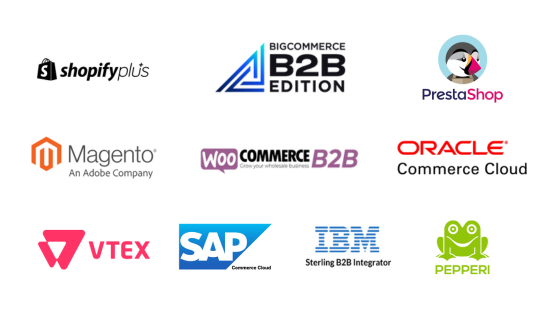
- What are B2B eCommerce Platforms?
- Why are B2B eCommerce Platforms Essential for Companies?
- Top 10 B2B eCommerce Platforms
- 1. Shopify Plus
- 2. BigCommerce B2B
- 3. PrestaShop B2B
- 4. Magento Commerce
- 5. WooCommerce B2B
- 6. Oracle Commerce Cloud
- 7. VTEX
- 8. SAP Commerce Cloud
- 9. IBM Sterling B2B Integrator
- 10. Pepperi
B2B eCommerce platforms emerged in response to the growing need for companies to conduct business transactions more efficiently and conveniently in the digital environment.
Although eCommerce has existed since the 1990s, it initially focused on B2C (business-to-consumer) transactions, with companies like Amazon and eBay leading the way.
However, as companies began to recognize the potential of eCommerce to facilitate transactions between businesses, new solutions specifically designed to meet these needs emerged.
In today's world, digital commerce is an unstoppable reality. B2B commerce is increasingly moving away from the physical realm, and most companies are joining the eCommerce trend.
Additionally, B2B buyers have evolved, prompting companies to adapt to their demands and needs by seeking the right platform for their business.
What are B2B eCommerce Platforms?
B2B (business-to-business) platforms are digital infrastructures specifically designed to facilitate commercial transactions between companies.
Unlike B2C (business-to-consumer) eCommerce platforms, which focus on direct sales to the end consumer, B2B platforms are oriented toward meeting the needs of companies that buy and sell products or services to each other.
A B2B eCommerce platform is a digital tool that facilitates and streamlines business transactions between companies, offering specific functionalities to meet the unique needs of these commercial relationships.
Why are B2B eCommerce Platforms Essential for Companies?
B2B eCommerce platforms are essential for companies for several fundamental reasons that address the complexities and demands of business-to-business commerce. Here are some reasons why these platforms are essential:
Efficiency in Order Management: B2B eCommerce platforms allow companies to automate and simplify the ordering process, reducing errors and streamlining communication between suppliers and customers. This leads to greater operational efficiency and time savings.
Market Reach Expansion: These platforms enable companies to reach a broader audience of potential customers both nationally and internationally, overcoming geographical limitations. This can open new business opportunities and increase revenue.
Customer Experience Personalization: B2B platforms offer the ability to personalize the shopping experience for each customer, tailoring prices, catalogs, and promotions to the specific needs of each company. This enhances customer satisfaction and fosters long-term loyalty.
Centralized Customer Account Management: They allow companies to manage their customer accounts centrally, with restricted access according to specific roles and permissions. This facilitates the administration of complex business relationships and improves customer service.
Reduction of Operational Costs: By automating business processes, companies can reduce costs associated with manual order management, billing, and customer service. This leads to greater profitability and competitiveness in the market.
Integration with Enterprise Systems: B2B eCommerce platforms often integrate easily with existing enterprise systems, such as ERP and CRM, ensuring smooth management of information and business processes. This improves efficiency and data consistency across the organization.
Scalability and Flexibility: B2B platforms are highly scalable and can easily adapt to growth and changes in a company's business needs. This allows companies to remain agile and respond quickly to market demands.
Data-Driven Decision Making: They provide advanced analytics and reporting tools, enabling companies to track sales performance, analyze trends, and make strategic decisions based on data. This drives innovation and business growth.
B2B eCommerce platforms are essential for companies because they offer a wide range of benefits that can improve operational efficiency, increase revenue, and enhance customer satisfaction. These platforms are an integral part of the business strategy for any company engaged in business-to-business commerce.
Top 10 B2B eCommerce Platforms
Selecting the "best" B2B eCommerce platforms in the world can depend on each company's specific needs, as well as factors such as budget, the complexity of the products or services offered, and business objectives. However, here is a list of 10 B2B eCommerce platforms that are widely regarded as outstanding:
1. Shopify Plus
Shopify Plus is the enterprise version of the Shopify eCommerce platform, designed specifically for large companies and growing brands that require more advanced and customized solutions.
With its wide range of features and functionalities, Shopify Plus offers a solid platform for large-scale eCommerce success.
Over 7,000 B2B eCommerce brands use Shopify Plus, including Nestlé, Leese, Pepsi, and Bombas.
Advantages of Shopify Plus:
Scalability and Performance: Designed to handle large volumes of traffic and transactions, making it suitable for growing businesses needing a robust and scalable platform.
Advanced Customization: Offers greater flexibility in terms of design and functionality, allowing businesses to fully customize their online store to meet their specific brand and business needs.
Dedicated Support: Customers have access to 24/7 dedicated support, ensuring quick and personalized assistance for technical issues or inquiries.
Exclusive Features: Includes exclusive functionalities, such as the ability to create multiple stores and automate complex business processes, not available in standard Shopify versions.
Security and Compliance: Complies with the industry's highest security standards and is PCI DSS certified, ensuring the protection of sensitive information and compliance with security regulations.
2. BigCommerce B2B
BigCommerce B2B is a specialized solution of the BigCommerce eCommerce platform designed to meet the needs of business-to-business (B2B) commerce.
It offers a B2B solution that allows companies to customize product catalogs, establish negotiable pricing, and manage corporate customer accounts.
More than 60,000 brands use BigCommerce for their eCommerce websites, including Avery Dennison, Toyota, and The Real Yellow Pages.
Advantages of BigCommerce B2B:
B2B-Specific Functionalities: It offers a wide range of features specifically designed for the needs of business-to-business commerce, such as personalized pricing, customized catalogs, and corporate account management.
Scalability: Scalable and can easily adapt to business growth, handling large volumes of traffic and transactions seamlessly.
Ease of Use: Despite its ability to handle complex business operations, it remains easy to use and manage, allowing users to set up and customize their online stores with relative ease.
Integrations: Offers integrations with a wide variety of third-party applications and systems, allowing businesses to expand their online store's functionality as needed.
Technical Support: Provides strong technical support for its customers, ensuring quick and effective assistance for technical issues or inquiries.
3. PrestaShop B2B
PrestaShop B2B is a specialized solution within the open-source PrestaShop eCommerce platform, designed to meet the needs of business-to-business (B2B) commerce.
It is an open-source eCommerce platform that offers modules and extensions to adapt to B2B commerce, including features such as personalized pricing and customer account management.
Over 300,000 customers worldwide use PrestaShop, with a majority in Spain, France, and the United States, including Le chocolat des Français, Magimix, and Huygens.
Advantages of PrestaShop B2B:
Cost: It is an open-source platform, which means the base version is free. This can make PrestaShop B2B a more economical option compared to other commercial solutions.
Flexibility: It offers a wide range of themes and modules that allow you to customize and expand the functionality of the store according to the specific needs of B2B commerce.
Scalability: It is scalable and can adapt to the growth of your business, allowing for the seamless handling of large volumes of traffic and transactions.
Active Community: It has a large community of users and developers who contribute themes, modules, and technical support, which can be beneficial for solving problems and getting help in developing your online store.
4. Magento Commerce
It is a leading eCommerce platform that offers a wide range of features and functionalities for businesses of all sizes. Through its specific B2B edition, Magento Commerce for B2B provides solutions tailored to the unique needs of this type of transaction.
It offers countless integrations and a library of extensions, allowing you to set prices based on each customer type. It also enables you to create shopping cart discounts for specific users or companies.
More than 260,000 merchants use Magento B2B Commerce, including 3M and Procter & Gamble.
Advantages of Magento Commerce:
Flexibility and Customization: It offers high flexibility and customization capabilities, allowing businesses to tailor their online store to meet their specific B2B commerce needs.
Scalability: It is highly scalable and can adapt to the growth of your business, from small companies to large corporations, allowing for the seamless handling of large volumes of traffic and transactions.
B2B-Specific Functionalities: It offers a wide range of functionalities specifically designed for the needs of B2B commerce, such as personalized pricing, customized catalogs, and corporate account management.
Integrations: Magento Commerce has a wide variety of integrations with existing enterprise systems, such as ERP and CRM, as well as third-party applications, enhancing its functionality and flexibility.
Community and Support: It boasts a large community of users and developers who provide technical support, online resources, and a wide variety of extensions and themes, facilitating problem-solving and extending the functionality of the online store.
5. WooCommerce B2B
WooCommerce B2B is an eCommerce solution aimed at businesses looking to establish and manage B2B eCommerce operations using WordPress and WooCommerce as the base platform.
With its business-specific features, you can set personalized prices for each customer, create exclusive catalogs, and enable specific business functionalities. WooCommerce B2B offers a flexible and adaptable solution for business-to-business commerce.
WooCommerce powers 23% of the top eCommerce sites, with clients like Weber, Ghostbed, and AeroPress.
Advantages of WooCommerce B2B:
Flexibility and Customization: Offers great flexibility and customization capabilities through a wide range of plugins and themes. This allows the online store to be adapted to meet specific B2B commerce needs.
Cost: The base platform is free, which can significantly reduce initial implementation costs compared to other commercial platforms. Additionally, many plugins and extensions are low-cost or free.
Integration with WordPress: Integrated with WordPress, it can leverage the available functionalities and resources on the platform, such as blogs, SEO, and content management, which can be beneficial for marketing and promoting the online store.
Large Community and Support: Boasts a large community of users and developers who offer technical support, online resources, and a wide variety of plugins and themes, facilitating problem-solving and extending the functionality of the online store.
6. Oracle Commerce Cloud
Oracle Commerce Cloud is a comprehensive and scalable eCommerce platform developed by Oracle, providing a wide range of features and functionalities for businesses looking to establish and manage eCommerce operations, including B2B commerce.
It helps B2B companies connect their CRM customer and sales data with their financial and operational data to offer personalized experiences to buyers across all sales channels.
More than 3,000 brands use Oracle Commerce Cloud, including Construction Specialties and TrendFoods.
Advantages of Oracle Commerce Cloud:
Power and Scalability: It is a robust and scalable platform that can handle large volumes of traffic and transactions, making it suitable for large enterprises and global brands.
Omnichannel Experience: Offers a unified omnichannel experience that allows businesses to efficiently integrate and manage their online and offline operations, facilitating a consistent shopping experience across all channels.
Advanced Personalization: Has advanced personalization capabilities that allow businesses to offer highly personalized and relevant shopping experiences for each customer, improving customer satisfaction and increasing conversion rates.
Integration with Enterprise Systems: Easily integrates with existing enterprise systems, such as ERP and CRM, ensuring smooth management of information and business processes.
7. VTEX
VTEX is a Brazilian eCommerce platform that has expanded globally and become a leading solution in the market.
Among the B2B functionalities of VTEX, your customers can place bulk orders, request product quotes, and receive special discounts. The tool also allows you to create special product kits ready for purchase.
More than 3,400 merchants use VTEX, including Oster, Stanley Black & Decker, and Tekmovil.
Advantages of VTEX:
Omnichannel Experience: Provides a unified omnichannel experience that allows businesses to efficiently integrate and manage their online and offline operations, facilitating a consistent shopping experience across all channels.
Scalability: Highly scalable and can adapt to business growth, from small businesses to large corporations, allowing for the seamless handling of large volumes of traffic and transactions.
Advanced Personalization: Offers advanced personalization capabilities that enable businesses to provide highly personalized and relevant shopping experiences for each customer, improving customer satisfaction and increasing conversion rates.
Integrations: Easily integrates with a wide range of enterprise systems, such as ERP and CRM, as well as third-party applications, enhancing its functionality and flexibility.
Analytics and Optimization: Provides advanced analytics and reporting tools that allow businesses to gain insights into customer behavior, analyze trends, and make informed business decisions to optimize online store performance.
8. SAP Commerce Cloud
Formerly known as SAP Hybris Commerce, SAP Commerce Cloud is a robust and scalable eCommerce platform developed by SAP, one of the world's leading enterprise software companies.
It provides a comprehensive solution for B2B commerce, including features such as personalized pricing, customer account management, and marketing tools.
More than 23,000 companies use SAP Commerce Cloud for B2B commerce, including Beiersdorf, Carhartt, and Kodak.
Advantages of SAP Commerce Cloud:
Scalability and Performance: Highly scalable and can adapt to business growth, handling large volumes of traffic and transactions seamlessly.
Advanced Personalization: Offers advanced personalization capabilities that allow businesses to create highly personalized and relevant shopping experiences for each customer, improving customer satisfaction and increasing conversion rates.
Integration with Enterprise Systems: Easily integrates with existing enterprise systems, such as ERP and CRM, ensuring smooth management of information and business processes.
Analytics and Optimization: Provides advanced analytics and reporting tools that allow businesses to gain insights into customer behavior, analyze trends, and make informed business decisions to optimize online store performance.
Security and Compliance: Complies with the highest industry security standards and is PCI DSS certified, ensuring the protection of sensitive information and compliance with security regulations.
9. IBM Sterling B2B Integrator
IBM Sterling B2B Integrator is a comprehensive solution designed to facilitate the management of business-to-business (B2B) transactions. This platform facilitates collaboration and communication between business partners.
IBM Sterling B2B Integrator is a complete solution for managing B2B transactions, offering system integration, process automation, and supply chain management.
Several brands use IBM Sterling B2B Integrator for their eCommerce websites, including Brother, Pacific Coast Food Distributors, and Allen Lund.
Advantages of IBM Sterling B2B Integrator:
Security: Provides a secure environment for exchanging sensitive business data, using advanced security protocols such as HTTPS, SFTP, and AS2 to ensure the protection of confidential information.
Process Automation: Allows for the automation of a wide variety of business processes, such as order management, electronic invoicing, and inventory management, helping to improve the efficiency and accuracy of operations.
Integration with Enterprise Systems: Easily integrates with existing enterprise systems, such as ERP and CRM, ensuring smooth management of information and business processes.
Visibility and Tracking: Provides real-time visibility into business transactions and detailed workflow tracking, enabling businesses to monitor and analyze the performance of their business operations.
Scalability: Highly scalable and can adapt to business growth, allowing for the seamless handling of large transaction volumes and collaboration with an increasing number of business partners.
10. Pepperi
Pepperi is a mobile sales and B2B eCommerce platform designed for consumer goods and retail companies looking to optimize their sales and eCommerce operations.
Pepperi's highlight is its ease of use for its customers, who can shop from its website or a mobile app, using a storefront customized for their customer profile. It also integrates with a large number of third-party providers for shipping, payment, email marketing, and more.
More than 1,000 customers use Pepperi, including Kimberly-Clark, Sodastream, Dermalogica, and Hallmark.
Advantages of Pepperi:
Mobility: Allows sales representatives to access the platform from mobile devices, enabling them to place orders, update inventories, and access product information in real-time while in the field or interacting with customers.
Order and Customer Management: Has comprehensive tools for order and customer management, allowing businesses to optimize their sales processes, manage inventories, and maintain effective customer relationships.
Customization: Offers customization options to meet the specific needs of each business, allowing for the configuration of personalized product catalogs, special customer pricing, and specific sales rules.
Integrations: Integrates with a variety of enterprise systems, such as ERP and CRM, as well as eCommerce and payment platforms, facilitating data synchronization and the management of business operations.
Analytics and Reporting: Provides analytics and reporting tools that allow businesses to gain insights into sales performance, analyze trends, and make informed decisions to optimize business operations.
In conclusion, B2B eCommerce platforms offer a wide range of advantages that can help businesses optimize their commercial operations, improve customer experience, and increase competitiveness in the market.


